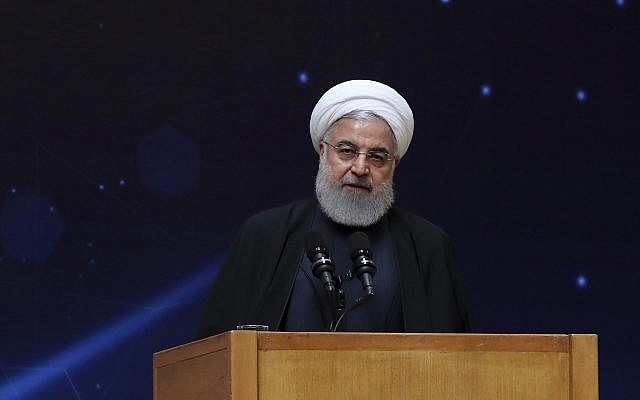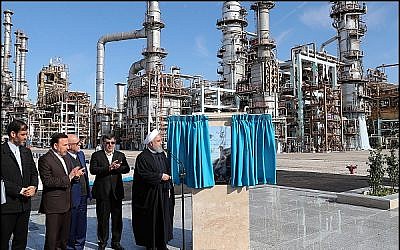Islamic Republic leader says America must first be made to regret its ‘illegal’ actions, then Washington must show mutual respect and remorse

Iranian President Hassan Rouhani on Wednesday said Iran would be willing to negotiate with the US if it reverses economic sanctions and apologizes for its “illegal” actions, according to official media outlets.
Rouhani’s remarks at the weekly cabinet meeting came a day after the Trump administration announced it was seeking to stop all Iranian oil exports.
“We have always been supporters of negotiation and diplomacy, the same way that we have always been a people of war and defense,” Rouhani was quoted as saying in state media.
“Negotiations will take place after all the pressures are lifted, they apologize for their illegal actions, and there is mutual respect,” he said. “But first, we have to make America regret its actions.”
Rouhani said that reports that Iran had rebuffed American offers to negotiate were not true.
On Monday the US announced that, in a bid to reduce Iran’s oil exports to zero, it would from May 2 end US waivers that countries such as India, China, South Korea and Turkey currently have on buying Iranian crude.
China warned Tuesday that the US decision to impose sanctions on buyers of Iranian oil will “intensify turmoil” in the Middle East and in the international energy market. India said it would buy crude oil from other major oil producing countries in view of the US decision.

The administration had granted eight waivers when it re-imposed sanctions on Iran in November. These expire May 2.
The move targets the Islamic Republic’s main economic earner and adds to sanctions pressure that has built up under US President Donald Trump, who has pulled his country out of a 2015 international deal aimed at curbing Iran’s nuclear program. It will choke off more than $50 billion of annual Iranian income, which the US says the country uses to fund destabilizing activity in the Middle East and beyond.
The nuclear deal, one of former president Barack Obama’s signature foreign policy achievements, gave Iran billions of dollars in sanctions relief in exchange for curbs on its nuclear program, which many believed it was using to develop atomic weapons.
Trump and other critics of the deal said it gave Iran too much in return for too little, allowed Iran to gradually resume nuclear activity that could eventually be used for weapons development and did not address any of the country’s other problematic activities.
As reported by The Times of Israel
